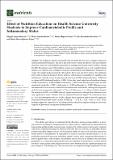Por favor, use este identificador para citar o enlazar a este item:
http://hdl.handle.net/10261/340151COMPARTIR / EXPORTAR:
 SHARE SHARE
 CORE
BASE CORE
BASE
|
|
| Visualizar otros formatos: MARC | Dublin Core | RDF | ORE | MODS | METS | DIDL | DATACITE | |

| Título: | Effect of nutrition education on health science university students to improve cardiometabolic profile and inflammatory status |
Autor: | López-Moreno, Miguel CSIC ORCID; Garcés-Rimón, Marta CSIC ORCID; Miguel, Marta CSIC ORCID ; Fernández-Martínez, Elia; Iglesias López, María Teresa | Palabras clave: | Vitamin D Monocyte University students Serum lipids Nutritional education |
Fecha de publicación: | 5-nov-2023 | Editor: | Multidisciplinary Digital Publishing Institute | Citación: | Nutrients 15(21): 4685 (2023) | Resumen: | The inadequate lifestyle associated with university life may have a negative impact on various cardiometabolic factors. The aim of this study was to evaluate the effect of a one-year nutrition education course on cardiometabolic parameters in undergraduate health science students. During the 2021–22 academic year, 1.30 h nutrition sessions were conducted twice a week. Capillary blood samples were collected and centrifuged to measure cardiometabolic and inflammatory biomarkers in serum. The sample studied consisted of 49 students: 20.4% male and 79.6% female. The nutritional intervention resulted in changes in dietary patterns, with increased consumption of vegetables, nuts and legumes. After the course, females showed an increase in HDL-cholesterol levels (p = 0.007) and no change in LDL-cholesterol levels (p = 0.189). On the other hand, males showed significant changes in HDL-cholesterol (p = 0.001) and LDL-cholesterol (p = 0.043) levels. The atherogenic index was also significantly reduced (p < 0.001) in both males (p = 0.009) and females (p = 0.002). Differences were also observed in the increase in vitamin D levels in both males and females, although the magnitude of the increase was greater in the men (Δ = 7.94, p = 0.016 in men vs. Δ = 4.96, p = 0.001 in women). The monocyte-to-HDL ratio (MHR) showed a significant reduction, although these differences were only significant in males. Students with low vitamin D levels had higher LDL-cholesterol values (p = 0.01) and atherogenic index (p = 0.029). Adjusted linear regression analysis showed a significant association between post-course vitamin D MHR (β = −0.42, IC: −0.29, −0.06, p < 0.01). These findings suggest the importance of including nutrition education programs during the university stage for the prevention of long-term health problems. | Descripción: | This article belongs to the Special Issue Influence of Mediterranean Diet on Gut Microbiota. | Versión del editor: | https://doi.org/10.3390/nu15214685 | URI: | http://hdl.handle.net/10261/340151 | DOI: | 10.3390/nu15214685 | E-ISSN: | 2072-6643 |
| Aparece en las colecciones: | (CIAL) Artículos |
Ficheros en este ítem:
| Fichero | Descripción | Tamaño | Formato | |
|---|---|---|---|---|
| nutrients-15-04685.pdf | 700,24 kB | Adobe PDF |  Visualizar/Abrir |
CORE Recommender
Page view(s)
21
checked on 21-may-2024
Download(s)
25
checked on 21-may-2024
Google ScholarTM
Check
Altmetric
Altmetric
Este item está licenciado bajo una Licencia Creative Commons

